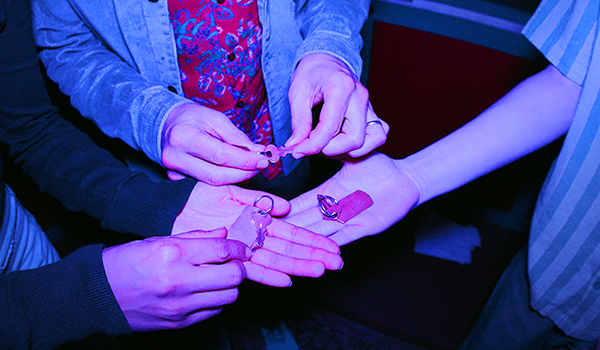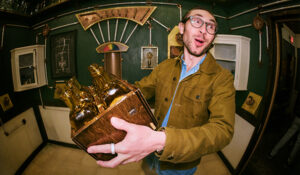Introduction: More Than Just a Game
The word “play” often conjures images of childhood, of unstructured fun without a purpose. But what if play is one of the most powerful, underutilized tools for adult development, especially within a team? The modern workplace demands creativity, resilience, and seamless collaboration—qualities that aren’t just learned in a boardroom. This article explores the thesis that escape rooms are more than just a fun outing; they are carefully designed environments, grounded in psychological principles, that actively forge stronger, more effective teams. By immersing a group in a high-stakes, collaborative challenge, you create a potent catalyst for growth. At Palace Games, we see this transformation happen every day within the historic walls of San Francisco’s Palace of Fine Arts, where teams don’t just play a game, they engage in a sophisticated exercise in collective problem-solving.
The Psychology of Collaborative Play
Collaborative play, in the context of organizational psychology, is a voluntary activity where a group engages with a challenge under a shared set of rules, working together toward a common goal. Escape rooms are a perfect embodiment of this, triggering several key psychological states that are highly beneficial for team development. One of the most important is the concept of ‘group flow,’ a state of deep immersion and energized focus where team members are fully synchronized in their actions and thoughts. Research on group flow identifies factors like shared goals and clear, immediate feedback as crucial for achieving this state, both of which are core components of an escape room experience [1].
The 60-minute time limit introduces another critical element: eustress. Unlike distress, which is negative and draining, eustress is a positive form of stress that is perceived as a challenge, leading to heightened focus and motivation [2]. This pressure encourages teams to perform at their peak. Furthermore, escape rooms function as a non-zero-sum game. In game theory, this is a scenario where participants’ gains and losses don’t have to add up to zero; through cooperation, it’s possible for everyone to win together [3]. The only way to ‘beat the room’ is for every single person to contribute, making collaboration the only viable strategy.
How Do Escape Rooms Improve Communication?
The time-sensitive and puzzle-dense nature of an escape room forces teams to rapidly discard inefficient communication habits. There is no time for lengthy debates, talking over one another, or withholding information. To succeed, a team must quickly establish a system for sharing information clearly, listening actively to every member, and validating ideas without ego. The environment naturally selects for the most efficient communication patterns.
Imagine a scenario in a room like The Great Houdini Escape Room: one player might find a series of numbers on a hidden panel. Simultaneously, another player across the room notices a book with a coded message. A third player is working on a lock that requires a four-digit code. Separately, these clues are useless. The team must learn to shout out what they see, listen for connections, and synthesize disparate pieces of information into a single solution. This forces a level of verbal collaboration and shared awareness that is often missing in day-to-day work projects.
What is the Benefit of a Shared, Immersive Challenge?
A shared, immersive challenge builds powerful group cohesion by creating an ‘us vs. the room’ mentality. This sense of shared adversity is a potent bonding agent. Studies in psychology have shown that teams who face and overcome adverse experiences together report higher levels of social support and even enhanced creativity [4]. The immersive narrative of a Palace Games room, rooted in the history of the 1915 World’s Fair, transports a team out of their normal work environment. Suddenly, job titles and office hierarchies fade away, replaced by a group of equals united against a common foe: the puzzle.
This effect is consistently reported by our corporate clients. For example, one team from Google noted, “The puzzles were challenging and really forced us to work together. It was a great team building event.” Overcoming a series of small challenges together—finding a key, deciphering a code, unlocking a new area—builds a powerful sense of momentum and collective confidence. This shared history of success becomes a resource the team can draw upon long after they’ve left the Palace of Fine Arts.
From Puzzles to Real-World Problem-Solving
Business challenges are rarely linear or simple; they are complex, multi-faceted problems that require input from various perspectives and skill sets. Escape room puzzles are designed to mirror this complexity. They demand a mix of spatial reasoning, pattern recognition, logic, and creative thinking. A single room may contain a puzzle that requires keen observation, another that needs mathematical precision, and a third that involves a moderate physical action.
This variety allows different team members to step up and shine at different moments. For instance, the challenges in The Roosevelt Room might appeal to those who enjoy hands-on, tactile problem-solving, while the intricate, multi-layered mechanical puzzles of The Edison Room may be where the logical thinkers excel. By engaging in this dynamic problem-solving process, teams learn to identify and leverage the diverse strengths of their members, a skill that is directly transferable to tackling complex projects back in the office.
Expertise Forged in Competition: The Palace Games Difference
Crafting an experience that perfectly balances challenge, fun, and team dynamics is not an accident. Palace Games is not just an escape room operator; it is a company founded and run by world-class puzzle experts. This expertise is our key differentiator. The team behind our games are the winners of the 2019 MIT Mystery Hunt, one of the oldest, most complex, and most prestigious puzzle competitions in the world.
This background in competitive puzzle design means that every element of our games is meticulously engineered to facilitate teamwork and create ‘aha!’ moments. It is this deep understanding of puzzle mechanics and player psychology that has led to our games being consistently ranked among the best in the world. When your team plays at Palace Games, they are not just solving puzzles; they are engaging with a finely tuned instrument designed by masters of the craft to make them a better team.
Bringing the Lessons Back to the Office
The benefits of an escape room experience can extend far beyond the 60 minutes of gameplay, but it requires a deliberate effort to transfer the lessons learned. We strongly encourage teams to hold a post-game debrief to discuss their experience. What communication strategies worked well under pressure? Who naturally stepped into a leadership role? How did the team handle moments of frustration or disagreement? These reflections are what turn a fun activity into a lasting developmental experience.
To help facilitate this crucial step, Palace Games offers a rentable event space, The Game Room, which is perfect for holding a debrief, meeting, or celebration immediately following your escape room adventure. Continuing the conversation in a relaxed environment allows the team to solidify their insights and make concrete plans for applying their new collaborative strategies back at work.
Key Takeaways: The Science of Stronger Teams
To summarize, escape rooms are powerful tools for team development because they are built on proven psychological principles.
-
Accelerated Bonding: Escape rooms place teams into a ‘flow state’ under positive pressure (eustress), accelerating the bonding process.
-
Forced Efficiency: The time limit and puzzle structure force teams to adopt clear, efficient communication and collaborative problem-solving.
-
Unified Identity: Immersive narratives and a shared challenge break down workplace hierarchies and foster a unified ‘us vs. the room’ identity.
-
Transferable Skills: The non-linear, multi-faceted puzzles require teams to leverage diverse skills, a process directly transferable to complex business challenges.



